Hoteliers’ business acumen is supported by the tech tools they use to capitalise on guest feedback, and the data collected by those automated solutions helps hoteliers discover strategic opportunities that benefit guest experiences and healthy hotel reputations.
Needless to say, it’s important to fine-comb through guest data, and report on it in ways that can be interpreted and acted upon from top management down to front-of-house.

Hoteliers use guest intelligence technology to monitor key guest experience indicators (like Net Promoter Score, overall satisfaction, value for money, etc.) and zoom into how they individually impact other aspects of hotel performance (RevPaR, occupancy, ADR). After all, the best way to understand hotel performance other than revenue is with guest satisfaction.
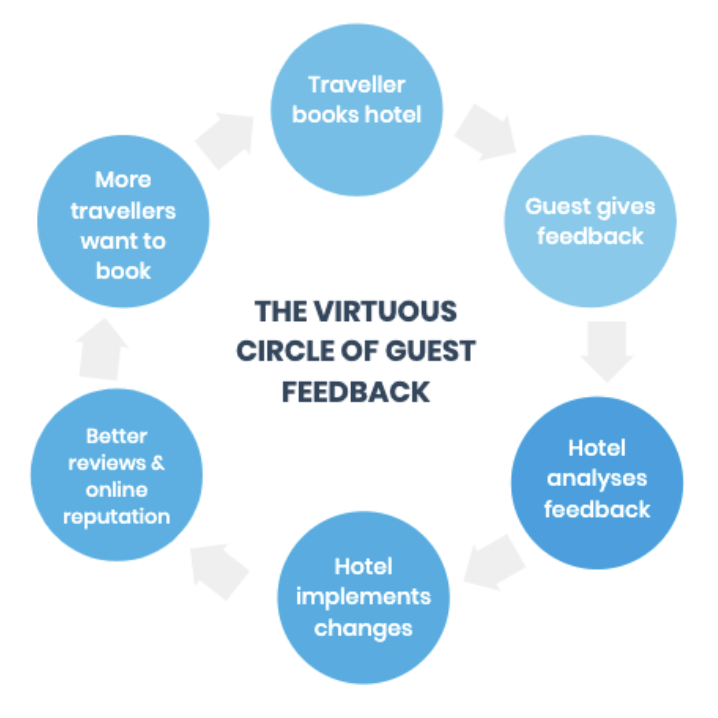
Understanding the importance of rich data about how each performance attribute impacts your guests means you can appreciate what we call the virtuous circle of guest feedback, as it helps you focus your time and resources where they’re needed most.
The virtuous circle represents how hotel reputations are built and maintained with the use of feedback data. Feedback forms the foundation for all the reports we mention below, and those reports influence how you approach your day-to-day operations, how you evaluate your team’s performance and how you set goals for different departments to reach.
Using the right online reputation management and direct guest feedback software makes it easier to visualise your hotel’s performance by giving you in-depth data and statistics, so that you can report to managers, owners and staff on the different aspects of your experience before you strategize how you will improve it.
Reports that show which department is performing the best and the worst
There are two aspects of your guest feedback that you will want to analyse and report on. The fist one is relatively simple, it's ratings, and how those ratings change over time. If you want to get more specific and actionable insights, you will want to track not just your overall rating, but the ratings for different departments and areas of guest experience.
At GuestRevu, we call those relatively simple metrics Primary Service Ratings. Some would say that the Primary Service Rating report and the Sentiment Analysis report are the most important to look at, and we tend to agree. Hospitality should always be guest-centred even though the bottom line is top priority, and we believe that approach often produces the best results for hoteliers who take the time to analyse what their guests say online.
When it comes to Service Ratings, you get to elevate your use of guest data by looking at everything your Primary Service Rating consists of, for example room quality, ambience, food and beverage facilities, staff and so on. It all depends on the kind of feedback you are looking for, and how you customise your questionnaires and surveys to get particular engagements from your guests. Below is an example of how detailed you can be at looking into feedback about your Staff Service ratings alone.
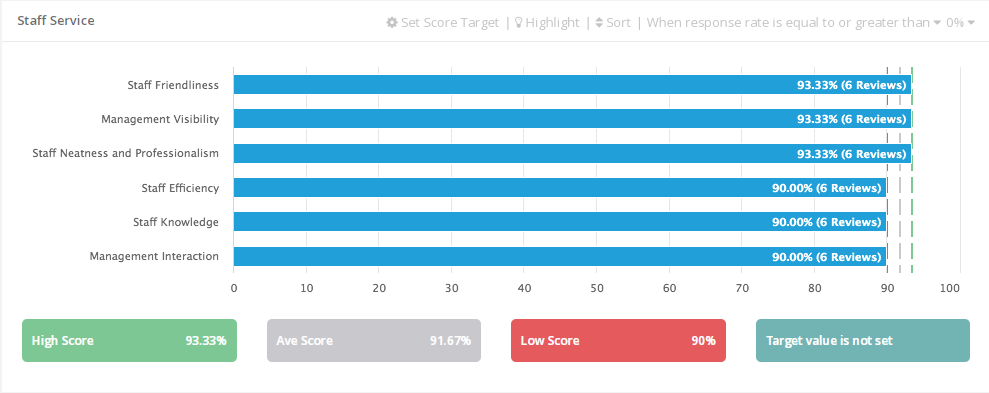
With the ability to compartmentalise feedback about everything your guests experience, you can set benchmarks more accurately, and even compete with your neighbours better. This is the role played by an integrated tech stack; it helps you break the data down in ways you can understand and act on.
Without an integrated tech stack, it’s an uphill battle trying to make certain connections and truly understand your guest experience. For example, research by King’s College London revealed that on Tripadvisor, “Rooms” is the most important attribute and “Location” is the least important for hotel guests. “Value”, “Location”, and “Rooms” are important for guests who provided low overall ratings, while those who provided high ratings consider the “Service” and “Cleanliness” more important.
Those are the kind of insights you gain when you use an integrated tech stack, and it’s important because you need a bird’s eye view of your hotel business (from reports on these elements) before you revisit your gameplan at management meetings. Our clients can attest to the power of analysing guest feedback to affirm operational changes, and Dina Soliman, who was at the time head of brand and marketing at Queensway Group explains how Point A Hotels used theirs:
“Through GuestRevu feedback, we realised that Point A Hotel brand’s guests tend to be more environmentally conscious than the average consumer. When we evolved our breakfast proposition, we took away, as much as possible, any plastic packaging, anything that is deemed to be environmentally unfriendly… [because] they told us they do not want to see any plastic in our to-go packaging for the breakfast offering.”
Reports that show what kind of sentiment guests have about the hotel
The second aspect of your guest feedback that you need to track is much more difficult to report on quantitatively, because it is by its nature qualitative, and that's your guest sentiment. The guest might be a lenient scorer, and have given you a respectable three and half out of five, but prospective guests reading the content of that written comment can plainly see that this was one very disappointed guest.
How can you measure situations like this and report on the sentiment of guest reviews, especially at scale and over a length of time? Taking advantage of hotel tech with Sentiment Analysis reports is your best bet. It’s important to go beyond the ratings guests give you, and into their actual comments. Sentiment Analysis tools have machine learning and text analysis features that make sure everything your guests say about you online is summarised and brought to your dashboard.
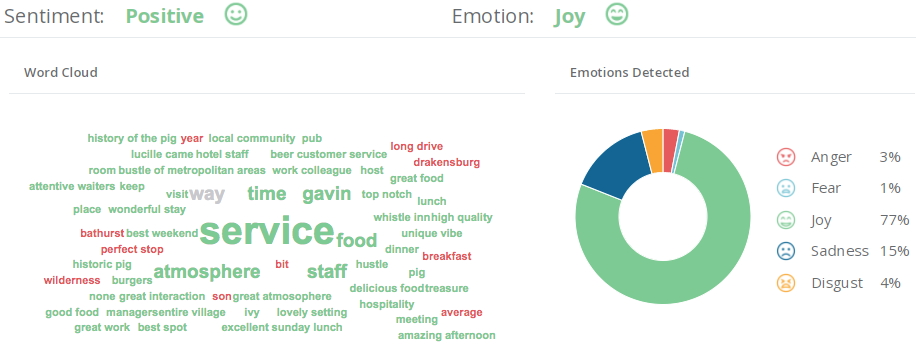
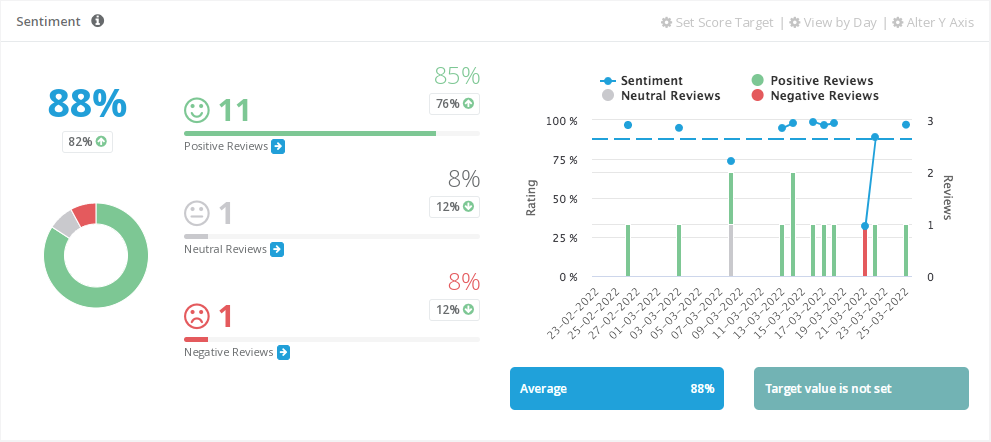
Simple visualisations like the word cloud and graph above make it easier to report on tons of data in meetings; everyone sees what sticks out and may need some work or applause; where more opportunities for growth lie; and even how the team’s momentum in relation to results is doing for the hotel overall. This helps to boost performance, affirms the interdependence of every role to the staff, and these reports can also motivate staff to do even better or encourage healthy competition amongst each other.
Every hotelier dreams of getting positive feedback when a guest is in their care, but the truth is, some guests don’t leave reviews at all. And even if every guest did leave a review, there is no guarantee that all of them would be in admiration of your hotel or service.
This is why there is a need to monitor your Net Promoter Scores (NPS) over certain periods of time, to gauge whether your services leave people wanting to promote you to the people they know, or whether you gained detractors that want nothing to do with you. NPS goes hand in hand with your Sentiment Analysis report, to give weight to the qualitative measure of your hotel’s performance beyond its ratings.
Reports to help you understand the effects of operational changes on guest experience
When owners hand over hard-earned cash for an upgrade, for example, or when you finally get the extra pair of hands you've been motivating for in reception, you need to be able to show that the investment has paid off. GuestRevu’s Milestone Markers help you track and visualise the impact of changes you make in every department.
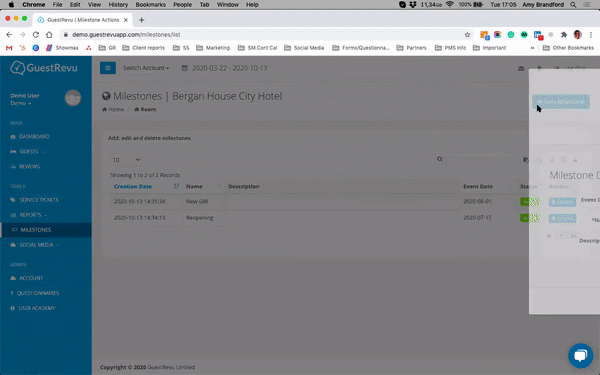
With this tool, you can monitor how every new hire, event, or renovation makes an impact on your guest experiences and feedback, and report to that specific department so those taking care of it know exactly where to focus.
Our trend report works in tandem with the use of milestones, to show the impact that milestones have on certain departments or on guest experience scores. This automated solution allows you to track your performance on multiple metrics before, during, and after to see the full impact a change has, over a specific time period set out by hotel management according to their strategy.
Reports that show how your hotel's performance compares to competitors
You should always have an eye on your competitors to remain agile against them, because chances are, they have the tech tools to check up on how you’re doing too. There is a wealth of information in online reviews from your competitors’ past guests that will help you understand how your operation compares to theirs.
To compile all this data from multiple review sites into a usable format is a time-consuming and tedious task, however, so it's imperative that you use the right online reputation management (ORM) tools to get an overall picture of how you measure up. Most ORM solutions will consolidate comparable scores from across multiple review sites for both you and your competitors so that you can easily see where your strategic strengths and weaknesses lie. This will help your reports when it comes to talks of staff performance, and keep your staff motivated to excel according to your hotel’s standards.
With a tool like this, you also have your finger on the pulse when you need to assessing your competitors every once in a while too, to make sure you are actually going head to head with the relevant brands and excelling with your internal goals while advancing in your market.
Reports that show how your overall performance has changed over time
All of these tools and features are accessible and helpful to results-driven hoteliers, and it doesn’t take a ‘numbers person’ to make sense of them. Another simple but effective feature to have is our Rolling report, as it’s flexible to your hotel’s strategy. You can use it to compare your average review ratings, different sources of reviews, and primary service ratings you’d like to compare over a time period defined by you. All the averages and scores are consolidated into one data point your staff can access, as seen in the screenshot below.
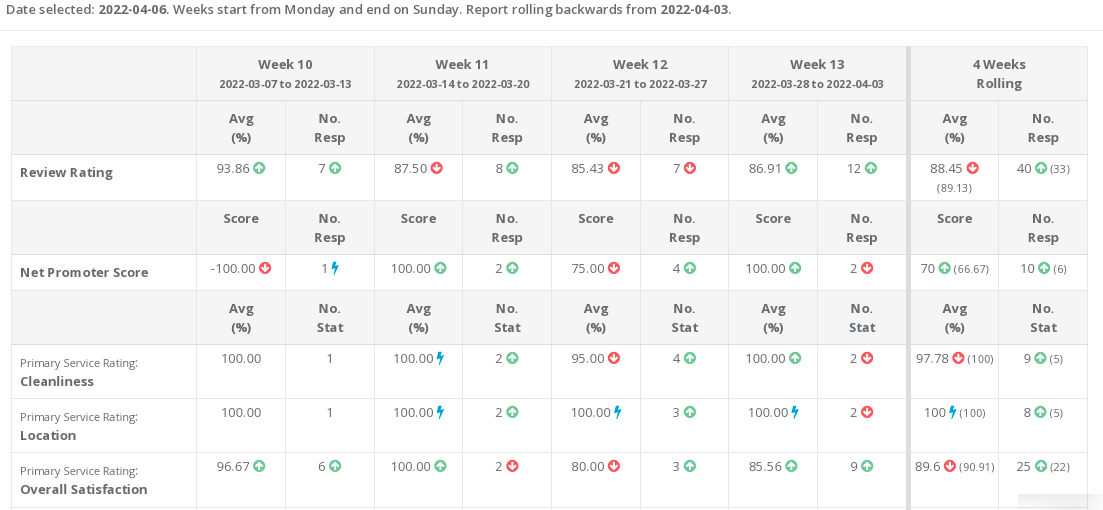
As we mentioned in the beginning, every element of your experience that your guests partake in has an underlying opportunity to teach you how to make it better for the next visitor. That is why every hotelier needs to look deeper into who their guests are, what they like and don’t like, and what can be done to communicate with them better.
Automated tools support every element of your reports
In times where almost everything happens digitally, seamlessly and quickly, you would be on the back foot doing research manually (or trying to get your guests to give feedback manually) these days. With the right tools, you know that even in your sleep, there is important feedback data that is being scoured and consolidated to put you in a better position to make adjustments.
The tools and features we've mentioned help hotels of different sizes and categories to build solid reports, because the principle use of data remains the same. Technology has reached a point where much of what you need to know about how to satisfy your guests can be found out for you, calculated for you, and presented to you in ways you can report and act on with a clearer picture in mind.
The valuable insights you gain when reporting on data from an integrated tech stack is what will push you in the right direction, to improve where you need to efficiently, and monitor your progress to ensure you stay on top of your goals and standards.




